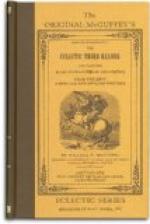But even in those early days, books would not sell themselves unless their qualities were made known to the public. Agents had to be employed—and at first Mr. Smith was his own best agent. There were expenses for travel and for sample books, for advertising, as well as for printing and binding.
[Illustration: W.B. Smith]
The Truman and Smith team did not always pull together. Mr. Truman was not versed in the schoolbook business. Mr. Smith was.
[The Dissolution]
It is said that Mr. Smith went early one morning to their humble shop on the second floor of No. 150 Main street, and made two piles of sample books. In one he put all the miscellaneous publications of the firm, big and little—the Child’s Bible and Sacred Harp among them—and on top of the pile placed all the cash the firm possessed; in the other, were half a dozen small text books, including the four McGuffey Readers. When Mr. Truman arrived, Mr. Smith expressed the desire to dissolve the partnership, showed the two piles and offered Mr. Truman his choice. He pounced on the cash and the larger pile and left the insignificant schoolbooks for Mr. Smith, who thereupon became the sole owner of McGuffey’s Readers.
This separation of the partnership took place in 1841 and although there is no documentary evidence of the exact method in which it was brought about, the division of assets was in accord with the spirit of the incident as handed down by tradition.
[A Lesson in Copyright Law]
Mr. Truman’s apparent disgust with the schoolbook business may have come in part from a lawsuit in which his firm was made a defendant. Sooner or later, publishers are quite likely to obtain some elementary instructions as to the meaning and intent of the copyright law through action taken in court. Messrs. Truman & Smith took a lesson in 1838.
On October 1st of that year Benjamin F. Copeland and Samuel Worcester brought suit in the court of the United States against Truman & Smith and William H. McGuffey for infringement of copyright, alleging that material had been copied from Worcester’s Second, Third, and Fourth Readers and that even the plan of the two latter readers had been pirated.
A temporary injunction was issued December 25, 1838; but before that date the McGuffey Readers had been carefully compared with the Worcester Readers and every selection was removed that seemed in the slightest degree an invasion of the previous copyright of the Worcester Readers. As these McGuffey books were still not stereotyped, it cost no more to set up new matter than to reset the old. On the title page of each book appeared the words, “Revised and Improved Edition,” and two pages in explanation and defense were inserted. In these the publishers stated that certain compilers of schoolbooks, in New England, felt themselves aggrieved that the McGuffey books contained a portion of matter similar to their own which was considered common property, and had instituted legal proceedings against them with a view to the immediate suppression of the McGuffey books and in the meantime had provided supplies of the Worcester books to meet the demand of the West.




